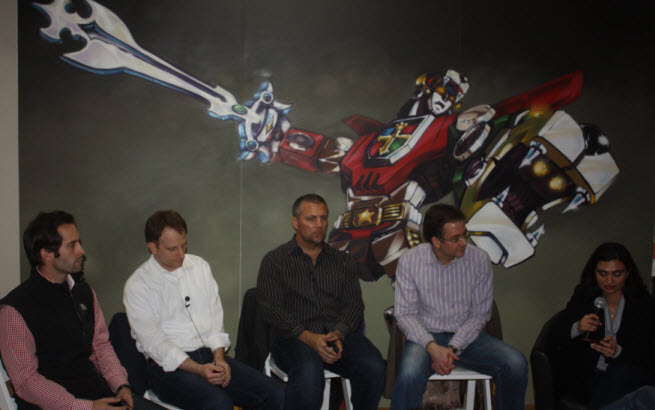When game developers such as Double Fine Productions began raising large amounts of money from fans earlier this year, they opened up a new source of funding that competed with traditional investors such as game publishers and venture capitalists. Developer Zynga’s stock price crashed earlier this year, it took a toll on the larger game industry. The social-title giant’s stock meltdown meant lower payoffs for game deals, and the valuations of game-startup investments dropped accordingly. The topic came up at the recent investor panel at the YetiZen game accelerator.
[aditude-amp id="flyingcarpet" targeting='{"env":"staging","page_type":"article","post_id":586018,"post_type":"story","post_chan":"none","tags":null,"ai":false,"category":"none","all_categories":"games,","session":"D"}']Sana Choudary (pictured far right), chief executive of Yetizen, moderated the panel, which consisted of (from left to right) Chris Gottschalk, vice president at Blumberg Capital; Jeff Karras, managing director of investments at Sing Tel Innov8; Chris Petrovic, general manager of GameStop Digital Ventures; and Eric Tilenius, executive-in-residence at Scale Venture Partners. Here’s a portion of the Q&A where Choudary asked question about Kickstarter.
We’ll post a longer Q&A from the discussion later.
Sana Choudary: Shifting gears a little bit to Kickstarter, since I’ve had a lot of investors come in and say all my companies should go to Kickstarter, which makes me want to kill myself … [laughter] 50 percent of all companies on Kickstarter hit their funding goals. But when you look at the gaming category, the success rate drops to 20 or 30 percent. From a quick eyeballing of most of those projects that do win in gaming, there are generally large consumer-facing game designer brands involved, which is why I discourage my companies from wasting time on Kickstarter. That being said, what do you think? Is a pre-existing brand the only way to chase success on Kickstarter? Is it a valuable use of time versus traditional funding methods?
Chris Petrovic: I’ll start off because it goes back to my earlier point about who the most attractive customers are. If you look at the majority of successful game projects — and I include both hardware and software that have gotten funded above their goal — it’s interesting that there’s a common thread there. They’re going after an audience of heavy spenders there. Call them core gamers, call them the male 18-34, call them whatever you want, but it’s not the casual audience. You’re not having that 45-year-old mom on Kickstarter investing in the next Flower or whatever it is. She’s not excited enough to invest her money for free or in return for getting a signed something from the developer. These are developers that have built communities based on really strong IP, based on a cultish following, because they attract hobbyists.
It’ll be interesting to see, with Ouya breaking all sorts of records and other game companies following suit, how these companies will execute and how they’ll come to market. But it’s clear to me that Kickstarter is an indicator of who the more valuable audience is for the gaming community. If you just take an unscientific poll of who the highest-funded projects were, you have game developer brands that have a legacy on PC and console. They’re taking their wares to new platforms, but it’s still this voracious community that wants more and more great game content. I think it’s a great kind of self-serving focus group for core gaming.
Eric Tilenius: On Kickstarter you have to convince people who you can get the job done. If you have talent and a team that has a legendary reputation, you’ll do that. If you have some totally unique hardware and a great video, you can do it too, but if you just have a brand-new game idea and you’ve never done a game before, why would I back you? There are so many choices in gaming. You need to have some distinctive advantage in what you’re developing. That being said, I will say that there are a lot of folks who are great gaming talents, and if you’re an entrepreneur, you can possibly hook up with some of those folks and do something interesting.
Chris Gottschalk: When you think about physical products, Kickstarter is almost now a pre-sale channel. Trying to pre-sell a freemium game is kind of awkward, so if I wouldn’t be surprised if the stats stay the same. I think it goes back to what we said earlier about having that community and having that brand recognition. That makes your job much easier. From an investor’s standpoint, I think it’s great. People give you money and don’t take any of the equity. It’s a great thing.

